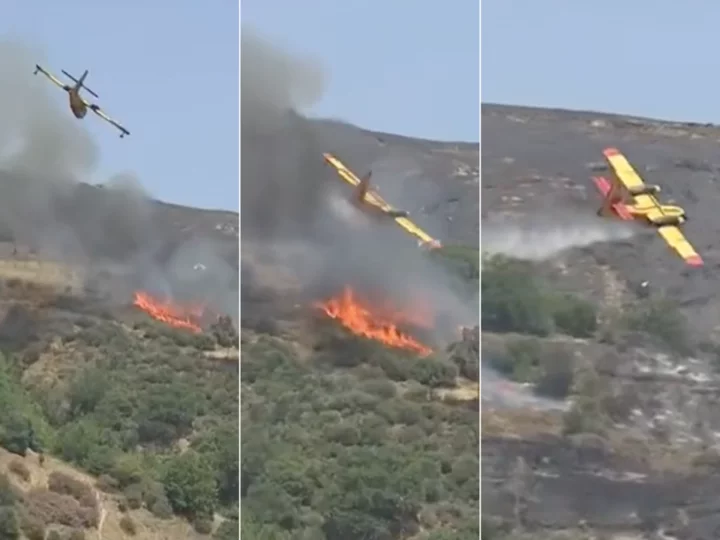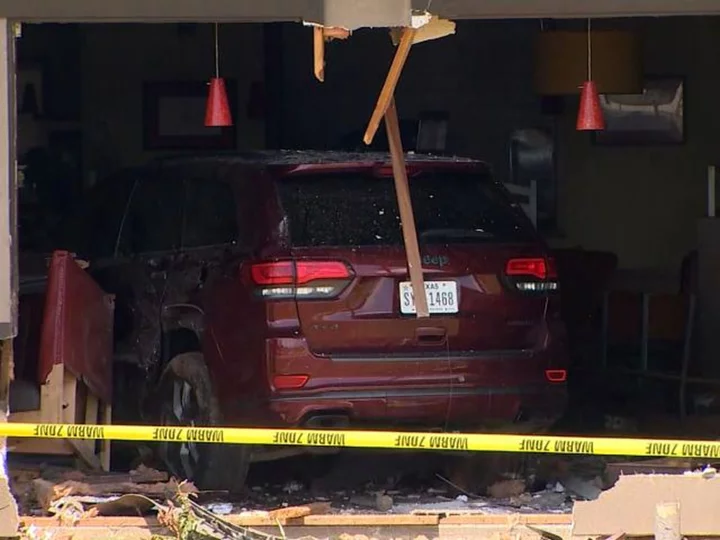Firefighters killed in Greece plane crash as yet more record temperatures are forecast
Two pilots fighting wildfires in Greece joined the death toll from the extreme weather blistering Europe on Tuesday, as temperatures are forecast to peak on Wednesday and the wildfire risk is set to remain high until at least the end of the week. Commander Christos Moulas, 34, and copilot Pericles Stefanidis, 27, died when their plane, which had been dropping water, crashed near the town of Karystos on the island of Evia near Athens, where one of a number of fires has been burning. A senior meteorologist at the Met Office, Amy Bokota, told The Independent that the latest heatwave gripping the Mediterranean is set to further intensify on Wednesday, when the extremely warm weather is expected to peak, with a high risk of wildfires continuing until at least Friday. Parts of Greece, Italy, Turkey and the Balkans will experience temperatures in the low to mid-40s Celsius on Wednesday, she said, with records likely to be broken in places. Wildfires rely on high temperatures and windy conditions, so although the temperatures are forecast to drop to a little above average on Thursday and Friday, the wind is due to increase and consequently the elevated risk of wildfires will continue, especially as “everything is so dry”, said Ms Bokota. A third successive heatwave in Greece pushed temperatures back above 40C in parts of the country on Tuesday. Tens of thousands of people have been evacuated from homes and resorts amid fires that have raged for days, exacerbated by strong winds. The holiday island of Rhodes has been hit particularly hard by the blazes, and the battle to contain the flames continued for a seventh day on Tuesday. The Greek government said authorities there were carrying out the largest evacuation ever undertaken in the country. Yet many British tourists are continuing to fly to Rhodes undeterred. Despite just 44 of the 85 scheduled passengers opting to travel on a morning flight from London Gatwick on Tuesday, the mood was mostly upbeat and the high number of empty seats went largely unnoticed, with one passenger remarking happily on the rarity of having enough space on a plane. “I’m sure you know it is hot,” the pilot announced as he began the descent, adding: “We all wish you luck in Rhodes, whatever the reasons are for you taking this flight out there today.” The crew returned to Gatwick with a packed flight of 186 passengers. “I want to get off the island as soon as possible,” one woman on holiday with her three young children told The Independent at the check-in queue at Rhodes international airport. Describing the terrifying moments prior to their party of seven’s escape from Lardos on Saturday afternoon, Jodie Sutton, a 31-year-old from Southport, said: “We were watching the fire coming over the mountain. It didn’t get too close, we were out of there. “[The evacuation was] chaotic, we were rammed on a coach with hundreds of people. It was hot and sweaty, and I’ve got three young kids with me.” “We got taken to a school in Archangelos, then that was in danger, so we had to move from there too, to Rhodos,” said the full-time mother, whose children are aged one, two and seven. “We had to sleep on the floor in a basketball court. The kids got blankets. The [volunteers] were amazing.” But she added: “Tui told us nothing. Jet2 told us nothing. We ended up phoning the fire brigade, the police and the British government and Greek government last night, and they said, ‘Stay where you are, you are safe.’” Another couple who visited nearby Lindos on Saturday, before the road to the village was shut because high winds were fanning the flames in unpredictable directions, recalled the smoke from the fires blocking out the sun like an eclipse. John Rennie, 49, a project manager from Southport, who was catching a flight to Manchester with his wife Marie-Claire, said they were ultimately only affected by power outages and water shortages. It was a minimal impact compared to that suffered by their host at Kremasti, whose family saw fire burn through two of their homes. “He was helping as a volunteer. There seems to be a big community circle on the island helping each other,” Mr Rennie told The Independent. Greek prime minister Kyriakos Mitsotakis has warned of difficult days ahead: “All of us are standing guard. In the face of what the entire planet is facing – especially the Mediterranean, which is a climate-change hot-spot – there is no magical defence mechanism. If there was, we would have implemented it.” Elsewhere, fire forced the temporary closure of Palermo airport in Sicily. Regional authorities said a woman died after an ambulance could not reach her home because of the blaze. Further north, the weather broke and an intense overnight storm tore off roofs and brought down trees in cities including Milan. Two women were killed in the northern provinces of Monza and Brescia. Algeria was fighting to contain devastating forest fires along its Mediterranean coast, where blazes have killed at least 34 people, including 10 soldiers encircled by flames during an evacuation, the country’s defence ministry said. Some 8,000 firefighters and 530 trucks, backed by military firefighting aircraft, fought the blazes in scorching heat. Wildfires spread to France on Tuesday afternoon, with several dozen firefighters using aircraft to battle a blaze in Cagnes-sur-Mer and Villeneuve-Loubet close to Nice international airport. While temperatures have been topping 40C in Europe, it has been even hotter in north Africa, with temperatures of 49C recorded in some cities in Tunisia. Extreme weather throughout July has caused havoc across the rest of the planet, mirroring the chaos wreaked throughout southern Europe, with record temperatures in China and the United States sparking forest fires, water shortages, and a rise in heat-related hospital admissions. Without human-induced climate change, the events this month would have been “extremely rare”, according to a study by World Weather Attribution, a global team of scientists that examines the role played by climate change in extreme weather. Read More Arsonists behind Corfu’s devastating wildfires as Greece ‘at war’ Tourists flying into Greece inferno reveal why they refuse to cancel holiday Greece wildfire: Video shows Rhodes hotel before and after blaze Playing with fire: We are not just breaking heat records, we are smashing them
Two pilots fighting wildfires in Greece joined the death toll from the extreme weather blistering Europe on Tuesday, as temperatures are forecast to peak on Wednesday and the wildfire risk is set to remain high until at least the end of the week.
Commander Christos Moulas, 34, and copilot Pericles Stefanidis, 27, died when their plane, which had been dropping water, crashed near the town of Karystos on the island of Evia near Athens, where one of a number of fires has been burning.
A senior meteorologist at the Met Office, Amy Bokota, told The Independent that the latest heatwave gripping the Mediterranean is set to further intensify on Wednesday, when the extremely warm weather is expected to peak, with a high risk of wildfires continuing until at least Friday.
Parts of Greece, Italy, Turkey and the Balkans will experience temperatures in the low to mid-40s Celsius on Wednesday, she said, with records likely to be broken in places.
Wildfires rely on high temperatures and windy conditions, so although the temperatures are forecast to drop to a little above average on Thursday and Friday, the wind is due to increase and consequently the elevated risk of wildfires will continue, especially as “everything is so dry”, said Ms Bokota.
A third successive heatwave in Greece pushed temperatures back above 40C in parts of the country on Tuesday. Tens of thousands of people have been evacuated from homes and resorts amid fires that have raged for days, exacerbated by strong winds.
The holiday island of Rhodes has been hit particularly hard by the blazes, and the battle to contain the flames continued for a seventh day on Tuesday. The Greek government said authorities there were carrying out the largest evacuation ever undertaken in the country.
Yet many British tourists are continuing to fly to Rhodes undeterred. Despite just 44 of the 85 scheduled passengers opting to travel on a morning flight from London Gatwick on Tuesday, the mood was mostly upbeat and the high number of empty seats went largely unnoticed, with one passenger remarking happily on the rarity of having enough space on a plane.
“I’m sure you know it is hot,” the pilot announced as he began the descent, adding: “We all wish you luck in Rhodes, whatever the reasons are for you taking this flight out there today.” The crew returned to Gatwick with a packed flight of 186 passengers.
“I want to get off the island as soon as possible,” one woman on holiday with her three young children told The Independent at the check-in queue at Rhodes international airport.
Describing the terrifying moments prior to their party of seven’s escape from Lardos on Saturday afternoon, Jodie Sutton, a 31-year-old from Southport, said: “We were watching the fire coming over the mountain. It didn’t get too close, we were out of there.
“[The evacuation was] chaotic, we were rammed on a coach with hundreds of people. It was hot and sweaty, and I’ve got three young kids with me.”
“We got taken to a school in Archangelos, then that was in danger, so we had to move from there too, to Rhodos,” said the full-time mother, whose children are aged one, two and seven. “We had to sleep on the floor in a basketball court. The kids got blankets. The [volunteers] were amazing.”
But she added: “Tui told us nothing. Jet2 told us nothing. We ended up phoning the fire brigade, the police and the British government and Greek government last night, and they said, ‘Stay where you are, you are safe.’”
Another couple who visited nearby Lindos on Saturday, before the road to the village was shut because high winds were fanning the flames in unpredictable directions, recalled the smoke from the fires blocking out the sun like an eclipse.
John Rennie, 49, a project manager from Southport, who was catching a flight to Manchester with his wife Marie-Claire, said they were ultimately only affected by power outages and water shortages. It was a minimal impact compared to that suffered by their host at Kremasti, whose family saw fire burn through two of their homes. “He was helping as a volunteer. There seems to be a big community circle on the island helping each other,” Mr Rennie told The Independent.
Greek prime minister Kyriakos Mitsotakis has warned of difficult days ahead: “All of us are standing guard. In the face of what the entire planet is facing – especially the Mediterranean, which is a climate-change hot-spot – there is no magical defence mechanism. If there was, we would have implemented it.”
Elsewhere, fire forced the temporary closure of Palermo airport in Sicily. Regional authorities said a woman died after an ambulance could not reach her home because of the blaze. Further north, the weather broke and an intense overnight storm tore off roofs and brought down trees in cities including Milan. Two women were killed in the northern provinces of Monza and Brescia.
Algeria was fighting to contain devastating forest fires along its Mediterranean coast, where blazes have killed at least 34 people, including 10 soldiers encircled by flames during an evacuation, the country’s defence ministry said. Some 8,000 firefighters and 530 trucks, backed by military firefighting aircraft, fought the blazes in scorching heat.
Wildfires spread to France on Tuesday afternoon, with several dozen firefighters using aircraft to battle a blaze in Cagnes-sur-Mer and Villeneuve-Loubet close to Nice international airport.
While temperatures have been topping 40C in Europe, it has been even hotter in north Africa, with temperatures of 49C recorded in some cities in Tunisia.
Extreme weather throughout July has caused havoc across the rest of the planet, mirroring the chaos wreaked throughout southern Europe, with record temperatures in China and the United States sparking forest fires, water shortages, and a rise in heat-related hospital admissions.
Without human-induced climate change, the events this month would have been “extremely rare”, according to a study by World Weather Attribution, a global team of scientists that examines the role played by climate change in extreme weather.
Read More
Arsonists behind Corfu’s devastating wildfires as Greece ‘at war’
Tourists flying into Greece inferno reveal why they refuse to cancel holiday
Greece wildfire: Video shows Rhodes hotel before and after blaze
Playing with fire: We are not just breaking heat records, we are smashing them









